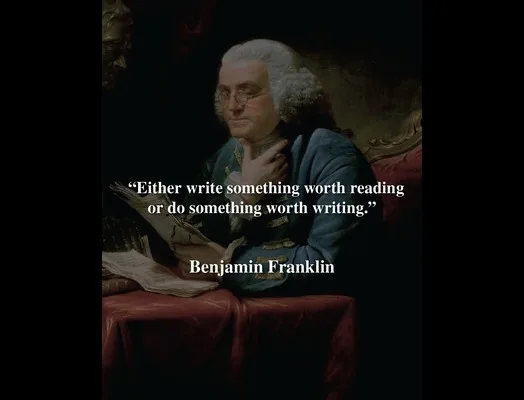Using Benjamin Franklin’s 13 virtues as guides can help us find very practical ways of dealing with the daily grind we experience. Again, however, these are not antiquated ideas; they are common-sense guidance on improving our lives and our relations with others. As the virtues become part of our daily lives, we can start to notice changes in how things go for us and in how we relate to others. In the end, Franklin’s virtues offer a perfectly realistic path to a more balanced and meaningful life in which we might navigate just a little better the complexities of the modern world and with a little more purpose.

To deal with such issues, and to live a better life, we may look at the Benjamin Franklin’s 13 Virtue. Franklin did not just write about these virtues; he practically followed them in his life through an easy-to-use checklist. Every day he reflected on his adherence to these virtues by marking off his compliance, focusing thus on the areas of improvement for the next day.
This deliberate practice, Franklin’s regular habit of daily recording the practice of his virtues, is transformed into a straightforward tool for helping anyone to develop that character. With a similar checklist, we can systematically change our own behaviors and become a better version of ourselves on our way to success and happiness.
Table of Contents
Understanding Benjamin Franklin’s 13 Virtues
Benjamin Franklin’s 13 virtues are more than ancient principles – they are timelessly guiding principles to a perfectly balanced and fulfilling life amidst a world full of incessant distractions and irresistible demands.
Benjamin Franklin’s 13 Virtues are about self-improvement and responsibility at their core. They’re supposed to help you manage your habits, focus your energy, and get along with others in a way that induces respect and effectiveness.
Benjamin Franklin’s 13 Virtues reflects a principle of behavior that Franklin considered necessary for a well-rounded and meaningful life.
Temperance is the thing that always elevates moderation in everything you do from eating and drinking, spending and leisure. It’s finding balance rather than indulging in excess. When there is a point of excess, many complications will knock your door. In continually seeking more-food, wealth, or whatever the hunger, we tend to lose ourselves in the process. Overindulgence will strain our health, erode our relationships, and ultimately leave us with a sense of dissatisfaction.
The pursuit of more than enough leads us down the road of tension and conflict and into a cycle that never ends with wanting because we never really end up content.
Moderation is embraced to increase our capacity to appreciate and enjoy life so much more, creating a feeling of well-being and fulfillment that excess cannot provide. know “Knowing enough is a superpower“.
Resolution pushes one to commit fully to their goals and to follow through on commitments in a way that reflects Franklin’s faith in the power of determination and consistency.
Benjamin Franklin’s 13 Virtues are not some airy-fairy ideals; they are intended to be applied to real life. Franklin once kept a daily list in which he reviewed his adherence to these virtues, which had turned out to be a way through which the thought leader would always reflect on the path of his development in life. These are hands-on methods that can be a mighty tool for anyone looking to inculcate better habits and live a more intentional life.
Following are the Benjamin Franklin’s 13 virtues
Temperance
“Eat not to dullness; drink not to elevation.”
In a world that lusts after indulgence, temperance is Franklin’s urging toward balance. The same virtue is practiced by Steve Jobs, who lived an unsophisticated life. In the light of temperance in eating, spending, or the use of time, our well-being and productivity also increase.
Silence
“Speak not but what may benefit others or yourself; avoid trifling conversation.”
This Loud, culture tends to forget about the value of silence. For instance, consider Warren Buffet or Charlie Munger, whose taste for listening over talking shows what thoughtful communication does for people. Making a show of taking care with words and making time for quiet can make a difference in human relationships, too, and professional development.
Order
“Let all your things have their places; let each part of your business have its time.”
Disorder is stressful and makes one a slacker. Elaboration of order as an ideal point of Franklin brings out the necessity of structure.
Resolution
“Resolve to perform what you ought; perform without fail what you resolve.”
Commitment is the key to attaining your goals. The determination of resolve in seeing justice can be witnessed through the commitment of Nelson Mandela. Following through on commitments eliminates most obstacles on the pathway to great success in life.
Frugality
“Make no expense but to do good to others or yourself; i.e., waste nothing.”
Frugality means that one holds money tight but allocates each available resource. The concept is the efficient use of finances with less waste and misuse in unnecessary spending, so choices are made to maximize value and minimize waste. Good resource management leads to success. That kind of care for the allocation of resources has helped Elon Musk to succeed in SpaceX and Tesla by promising reusable rockets. That has helped focus on something worthwhile: no waste.
Industry
“Lose no time; be always employed in something useful; cut off all unnecessary actions.”
Productivity is the key to success. In removing distractions and doing productive work, we are merely increasing productivity and making more sensible use of our time.
Sincerity
“Use no hurtful deceit; think innocently and justly, and, if you speak, speak accordingly.”
Honesty forms trust and integrity. Being honest with people we talk to strengthens relationships and increases credibility.
Justice
“Wrong none by doing injuries or omitting the benefits that are your duty.”
Fairness and responsibility feature a just life. In centering our efforts on fairness and the fulfillment of our duties, we constructively participate in our communities.
Moderation
“Avoid extremes; forbear resenting injuries so much as you think they deserve.”
Reactions are tempered such that we would not be pushed into extremes that would discomfit our psychological existence. Moderation avoids the excess pressure that would assert itself in our emotional equilibrium.
Cleanliness
“Tolerate no uncleanliness in body, clothes, or habitation.”
Cleanliness reflects self-caring and respect for our environment. In cleanliness, we can make our world a better place as well as a healthier one.
Tranquility
“Be not disturbed at trifles, or at accidents common or unavoidable.”
Calmness in adversity forms a necessary part. Serenity is adopted to cut anxiety and peace in everyday life. Calmness of mind in any situation is the greatest thing in the world. A calm person can face this world’s issues effectively and with a balanced judgement
“Calmness is the cradle of power.” – Josiah Gilbert Holland
Chastity
“Rarely use venery but for health or offspring, never to dullness, weakness, or the injury of your own or another’s peace or reputation.”
Chastity is abstinence from sexual activities outside of a relationship or marriage that is often established on moral, ethical, or religious reasoning. It is the literal expression of sexual purity through acting in self-control. Respectful behavior is an aspect of integrity. Contemplating chastity and morals build respectful and contented relationships. Being a person of integrity expands our relations and our well-being.
Humility
“Imitate Jesus and Socrates.”
Humility leads to continuous learning and personal development. Think of how Nelson Mandela humbled himself in leadership changed his life and all of ours. His example by empathetic leading and openness to listening is one way humility enables us to better ourselves. Humility allows us to develop more meaningful relationships, to understand each other, and obtain wisdom in all aspects of our lives-professional and personal.

Applying Benjamin Franklin’s 13 Virtues Today
I would say that Benjamin Franklin’s 13 virtues would provide the most practical guidelines one could use in mastering life while dealing with the intricacies of modernity. Through introspection into these practices and putting them into routines, we could improve personal and professional engagements. Actual essence of these post is you don’t need to follow all of these, but staying true to your own values, ethics and principles is what matters!
Hope You learnt something from Benjamin Franklin’s 13 Virtues.
We are committed to quality content that helps you master challenges and achieve your full potential. So, subscribe to find even more valuable resource and strategy building in your pursuit of a more fulfilling and successful life. bookmark this page.



